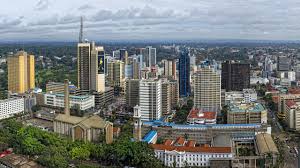Share this
In an April 2017 report titled “Kenya’s Economic Outlook to Dip in 2017”, the World Bank ( International Bank for Reconstruction and Development) projected that Kenya’s 2017 GDP was projected to be 5.5% – down from 6% in 2016.
The IBRD report was released ~6 months before the Supreme Court exposed an incompetent and partisan bungling of the general elections by the IEBC; one that set in motion an angry and incoherent reaction from an “entitled” Uhuru Kenyatta and his toadies.
Diarietou Gaye, the bank’s Country Director for Kenya attributed the country’s robust growth to “a stable macroeconomic environment, low oil prices, earlier favorable harvest, rebound in tourism, strong remittance inflows, and an ambitious public investment drive”.
The same report also cautioned that the country faced “…..headwinds…..” that had little to do with the elections and certainly not the current impasse as Jubilants would like the country to believe.
The report identified (a) the drought which led to crop failure, dying herds of livestock, and increased food insecurity, (b) poor rains that increased the cost of the country’s cheapest source of energy – hydroelectric, (c) spillover effect of both the increases in food and energy prices that combined to drive up inflation to a five-year high of 10.3% in March 2017. A net importer of oil, the country also begun to suffer the global price increases of the commodity throughout 2016 into 2017.
Notwithstanding, the foregoing are/were “headwinds” that effective planning and competent oversight (would) typically mitigate.
Kenya, a majority of her people and her leaders are corrupt. As a result, the country has had to face increased cost of borrowing because of its inability to curb the endemic scourge – across all segments of the country.
The economic impact of corruption was recently illustrated by the decision of VR Holdings AB of Sweden to move its planned Malindi power plant to Tanzania – this according to a piece in Business Daily (“Swedish firm moves Sh.235bn Malindi power plan to Tanzania”). A company spokesperson said that VR Holdings switched their focus to Tanzania….(because) Kenya is proving to be a ‘very difficult’ place…..”
“A very difficult place…..”? I will let the diplomat-speak stand on its own – given the principals: The preternaturally cordial and by-the-book Swedes and the ever corrupt and always-ready-to-eat Kenyans.
Added to the foregoing is a reality most jingoistic supporters of the status quo in Kenya are loath to admit: Kenya has not endeared itself to its east and central African neighbors.
Going back to the Nyerere/Kenyatta era shortly after independence, Tanzania, the region’s largest country, has always been wary of what its socialist-leaning founding father called the “dog-eat-dog” capitalistic ethos of Jomo Kenyatta.
Similarly, Rwanda and Uganda became increasingly distrustful of Uhuru Kenyatta’s obsession with mega-projects whose economic viability and cost-benefit-analysis were tenuous at best. This apprehension over the culture of “kitu kidogo” that pervades nearly all business deals Kenya signs was at the back of the minds of the country’s African Union (AU) partners when it came to voting for the next chairman of the continental body.
In a February 2017 piece titled “Details of how Amina Mohamed lost African Union Commission election”, the Standard writes that “some East African countries may have undermined Kenya’s candidate for the position of chairperson of the African Union Commission (AUC).” The article quotes South Sudan’s Ambassador to Ethiopia James Morgan as saying that Ms. Mohammed’s fate was sealed in part because of “how Kenya relates with its neighbors…..” with Burundi pointedly saying that “Kenya interferes with her internal affairs by condemning its internal conflict.”
Left unsaid by Mr. Morgan is the hypocrisy of a country less than 10years removed from near-genocidal post-election violence passing judgement on the internal conflict of another!
Finally, echoing what most Kenyans already knew, an unnamed S. African diplomat averred that Amina’s closeness with Mr. Kenyatta “might cloud her judgement as she could use the position to advance Kenya’s rather than Africa’s agenda.
One word: ICC.
Taken together, the narrative that “the ongoing demonstrations by NASA are ‘affecting’ the economy” is a deliberated and desperate attempt at deflecting responsibility from the country’s current leadership – Uhuru Kenyatta, William Ruto and Jubilee. Their failure to lead and assure the business and investment community of their fidelity to free market and more importantly, fidelity to the process of transparent and accountable democratic principles are more responsible for the skittish economy and business environment than the unarmed and relatively peaceful demonstrators.
All told, business and investors abhor uncertainty and that has been exacerbated by the drawn-out oftentimes vitriolic tone of the on-going race for the presidency.
And the notion that “Raila has not ‘sold’ his vision to Kenyans effectively” is a convenient default of those who have continued to bury their collective heads in the sand and refused to bite the hand that feeds them – President Uhuru Kenyatta – this instead of embracing Raila’s calls for good governance, accountability and an end to impunity.
The only scenario that would worry the business community and investor-class more than the perfect storm described above would be an ethnicized, corrupt, inept, militarized and trigger-happy law enforcement apparatus obviously carrying water for an ethnicized, corrupt and inept government led by an unhinged former crimes-against-humanity duo. Other than the visits to The Hague, the rest has been the case since independence.





